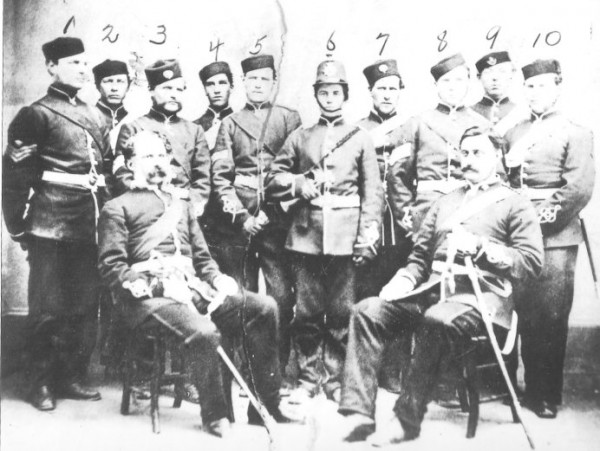
This article first appeared on Today in Alternate History.
"You have made a mistake. We were all over the countryside and, without exception among the Serbian population, greeted in such a friendly manner, with such sincerity and unrestrained warmth that we are really happy about it," Sophie, Duchess of Hohenberg playfully reprimanded a leading Croat politician who had begged them not to go to Sarajevo the following morning, June 27, 1914.
On May 30, 1914, Serbian army officers in the Black Hand organization overthrew the government of Prime Minister Nikola Pašič to push forward their agenda of uniting all Serbian-majority territories. Pašič had long been affiliated with the group, but his relationship had faltered due to bickering with the military about administration of new territories gained in the First and Second Balkan Wars. Pašič argued for democratic elections and ultimately dismissed the military administrator ahead of planned elections later in 1914. The Black Hand struck back, seizing all administrative power with the nod of of the king. This ill-fated coup was brought about by the rising tensions that were spreading across the Balkans region. Far from being an isolated event in Belgrade, it would have huge consequences and ultimately lead to the "July Crisis" of increasingly desperate diplomacy in Eastern Europe.
It was another step in the rising nationalism that had brought a new anti-Austrian king, Peter I, to the throne of Serbia a decade earlier. The Serbian emerging desire to expand their South Slav state of Serbs, Croats and Muslims had then been frustrated by the Austrian annexation of Bosnia-Herzegovina during 1908. The Russian Empire put intense pressure on the Serbs to accept this imposed outcome to the Bosnian Crisis since Austria had supported Russia annexation of Bessarabia. Bulgaria and then Albania gained independence from the Ottoman Empire. Serbian army officers had been ready to make a positive move when the Balkan Wars of 1912-3 began, further weakening the Ottomans' centuries-long grip on the region. Serbia's strong military performance worked against them and kept Pašič in office with the support of powerful Russian sponsors even though Austria still led influence in the Balkans.
At the end of the conflict, Archduke Franz Ferdinand, the Habsburg heir, was appointed Inspector-General of Imperial Forces. This meant that any subsequent action he took could be seen as an official act on behalf of the military. Worse still, it implied that his programme of change would be led (or even reinforced) by the military. Certainly, the Austrian Commander-in-Chief Franz Conrad von Hötzendorf believed that military intervention was necessary to prevent Serbia getting access to the ports on the Adriatic Sea.
As the Ottoman Empire declined, Russian-Austrian relations continued to deteriorate, and Serbians grew bolder. Given the impressive size of the sprawling Austro-Hungarian Empire, even the new government in Belgrade could not dare an aggressive move to occupy Bosnia-Herzegovina. Instead, they opted to win more public support broadcasting that Franz Ferdinand wanted to form a South Slav province of the empire and deny self-rule.
This identity-grab was his first move in an overarching plan to breathe new life into the empire and permit Habsburg domination of the southern Slavs to continue indefinitely. The archduke was a single-minded and determined individual who had married his Czech wife against the wishes of the emperor on the condition she could never become empress and their children could not ascend to the Habsburg throne. It might have been much wiser to wait until his succession to the eighty-four year old Emperor, his uncle Franz Josef, but Franz Ferdinand was not one to wait. For his southern aims, he unwisely planned a provocative state visit to Sarajevo on the anniversary of the Battle of Kosovo, a historic date in the Serbian calendar. The Habsburg Governor Oskar Potiorek needed the visit to be a success in order to demonstrate control over the new imperial province.
The Serbian government appealed to Nicholas Hartwig, the powerful Russian ambassador to Belgrade. He was reluctantly convinced that Franz Ferdinand's visit to Sarajevo was essentially an overstep that could soon lead to the proclamation of a South Slav province, a subjugation wholly unacceptable to the Russians. Their ambassador to Vienna Nikolay Nikolayevich Shebeko demanded that the visit be cancelled. The Archduke and his Czech wife ignored the demand, which was interpreted as over-lordship. Division arose among the South Slavs, some welcoming the tour while others spoke of rebellion.
This diplomatic dispute dominated the whole of July as Russia and Austria headed toward a Third Balkan War that Franz Ferdinand soon realized could be the end of both empires. It was tragic, since he had seen himself only proposing an imaginative solution to the restless struggle in the whole region. The rest of Europe watched on as the Balkans once again became embroiled in war, curious but unwilling to be any part of it.
Author's Note:
In reality, the Black Hand Society backed the Young Bosnians, a revolutionary movement that assassinated Archduke Franz Ferdinand.
That's a very cool take on a very different Italy! I'm curious to hear further about the impact of Moorish invasions and how that changed things up.
ReplyDelete